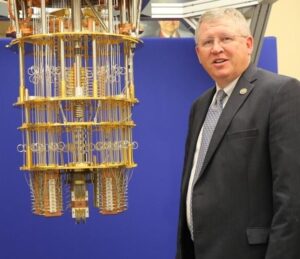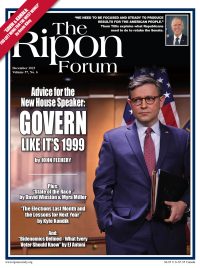
In the race to keep America at the forefront of scientific, technological, and economic competitiveness, maintaining our U.S. advantage in quantum science, engineering, and technology is of critical importance. Breakthroughs in quantum technologies are changing the world as we know it, and unless we continue to strengthen our domestic quantum industry, adversaries like China and Russia will dominate the sector and shape the infrastructure that will carry the 21st century technological landscape, leaving us vulnerable for decades to come.
Quantum computing utilizes the properties of atomic behavior to process information in unique ways and faster than traditional computers. Unlike classical computers, which can only store information in binary code of 1 and 0, quantum computers can handle complex data and a multitude of variables by analyzing information in various states of existence at the same time. The process is complex, but the outcome is information processing speeds and techniques that allows us to tackle problems that were previously thought impossible, revolutionizing our relationship with technology as we know it.
With this power, the widespread benefits of quantum computing cannot be overstated. From advances in chemistry, materials science, resource optimization, and military applications to revolutionary developments in healthcare, finance, agriculture, and more, the power of quantum science could soon touch nearly every facet of our lives. And these are just the applications we know of. With further development and maturation, the untapped potential looks to be limitless – who knows what doors our quantum abilities will open. But with this progress comes concerns of malign actors using the technology in harmful ways. That’s why it’s crucial that we secure our leadership in this space and outpace our adversaries who are hot on our heels.
Breakthroughs in quantum technologies are changing the world as we know it, and unless we continue to strengthen our domestic quantum industry, adversaries like China and Russia will dominate the sector.
As we look at our competition, China and Russia are making significant investments to bolster their development of quantum systems. The Chinese Communist Party is spending over $15 billion to advance quantum research and development activities, and Russia recently established its own National Quantum Laboratory with plans to reach a 100-qubit quantum computer by 2024. Russian agents were even recently caught and charged in New York for trying to steal and export U.S. quantum secrets, because our adversaries recognize we are leading the pack. These are cautionary signs that we cannot back down on our quantum commitments here at home. With the power this technology brings, our adversaries could easily weaponize quantum capabilities to crack encryption codes or breach our digital defenses, potentially accessing sensitive information from our military, businesses, research, and beyond.
These concerns have not fallen on deaf ears, as Congress has already made strategic investments to gain leadership in the quantum field. In 2018, the House Committee on Science, Space, and Technology, which I am now proud to Chair, passed the groundbreaking National Quantum Initiative Act (NQIA), the first piece of legislation dedicated to accelerating our domestic quantum abilities.
Over the last five years, funding from the NQIA and quantum industry has advanced quantum research, development, and technology here in the United States, and has already become transformative. Agencies including the National Institute of Standards and Technology, National Science Foundation, and Department of Energy have all utilized the legislation’s funding to build out state-of-the-art labs, conduct groundbreaking research, and develop robust industry partnerships. The NQIA has spurred major U.S. technology companies to invest in quantum research, collaborate with partners across the public and private sectors, and share resources and expertise. This has strengthened our efforts and global leadership even more.

The Chinese Communist Party is spending over $15 billion to advance quantum research and development activities, and Russia recently established its own National Quantum Laboratory.
The progress we have made with the NQIA is a step in the right direction, but we can’t stop here. I recently introduced the National Quantum Initiative Reauthorization Act, bipartisan legislation that will build upon the successes of the NQIA and cultivate and enhance our quantum ecosystem. The bill continues support for basic research, but it also looks to how we can advance translational research and move quantum applications forward. On top of expanding support for current quantum centers at the National Science Foundation and Department of Energy, the bill includes new efforts to develop international partnerships with U.S. allies, the establishment of new quantum centers at the National Institute of Standards and Technology to advance research in quantum sensing, measurement, and engineering, and the build out of workforce pipelines between our educational institutions and the quantum sector. The bill authorizes the creation of new quantum foundries and testbeds to provide a space for industry, academia, and government to come together to overcome cross-cutting challenges that will enable quantum technology. It also authorizes quantum R&D activities at NASA, an agency whose strength in groundbreaking science and technology development will no doubt bolster our lead in the global quantum race.
Looking ahead, the road to quantum success will not be easy. Whether it is computing, sensing, communications, or cryptography, quantum technologies face many scientific unknowns. However, we do know that this technological shift is going to be revolutionary, and the leaders in these fields will have the ability to leverage the power of quantum for better or for worse.
As the U.S. stands, we are in the right position to lead and ensure this powerful tool is used in accordance with our democratic values. We have made meaningful headway from the efforts of the NQIA and will leverage this progress to keep the momentum going with the Reauthorization Act. This is an all-hands-on deck effort by government, the private sector, academia and beyond, and I am confident the work we do together will preserve America’s global leadership in quantum science over the coming generations.
Frank Lucas represents the 3rd District of Oklahoma in the U.S. House of Representatives. He serves as Chairman of the Committee on Science, Space, and Technology.




